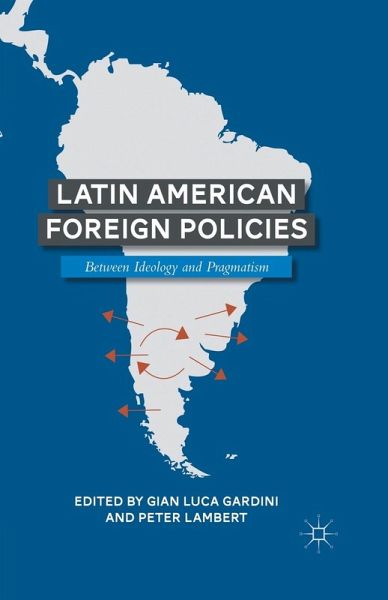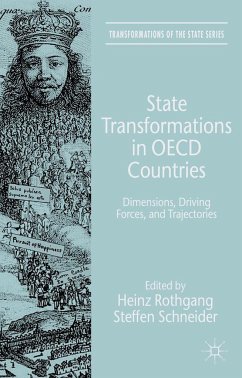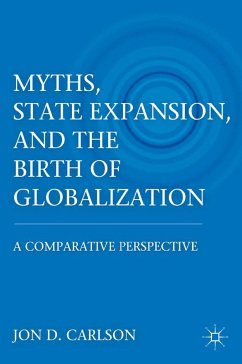
Peter Lambert
Broschiertes Buch
Latin American Foreign Policies
Versandkostenfrei!
Versandfertig in 2-4 Wochen
Weitere Ausgaben:

PAYBACK Punkte
29 °P sammeln!





In recent years several Latin American countries have adopted a more assertive and autonomous stance in their foreign policy. The growing rejection of neo-liberalism as an ideological dogma seems to have given space to more pragmatic stances in favour of national interests.
LARRY BIRNS Director of the Washington-based Council on Hemispheric Affairs, USA W. ALEJANDRO SANCHEZ Research Fellow for the Council on Hemispheric Affairs, USA DR. RONALD BRUCE ST JOHN MA and PhD in International Relations from the University of Denver, USA PROF. DAVID CLOSE Professor of Political Science, Memorial University of Newfoundland, Canada DR. ANA COVARRUBIAS Faculty member of the Centre for International Studies of El Colegio de México. PROF. JOAQUÍN FERMANDOIS Professor of Contemporary History at the Catholic University of Chile. PROF. MIRIAM GOMES SARAIVA Professor in International Relations at the University of the State of Rio de Janeiro, Brazil. PROF. ANTONI KAPCIA Professor of Latin American History, University of Nottingham, UK DR. ANDRÉS MALAMUD Assistant Research Professor at the Institute of Social Sciences of the University of Lisbon. PROF. DIANA RABY Professor Emeritus in History at the University of Toronto, and is a Research Fellow in the Institute of Latin American Studies at the University of Liverpool, UK. PROF. STEPHEN J. RANDALL Professor of History, University of Calgary, Canada.
Produktdetails
- Verlag: Palgrave MacMillan Us / Palgrave Macmillan
- 2011 edition
- Seitenzahl: 272
- Erscheinungstermin: 1. April 2011
- Englisch
- Abmessung: 216mm x 140mm x 17mm
- Gewicht: 367g
- ISBN-13: 9781349293551
- ISBN-10: 1349293555
- Artikelnr.: 45079407
Herstellerkennzeichnung
Libri GmbH
Europaallee 1
36244 Bad Hersfeld
gpsr@libri.de
'This volume chronicles the coming of age of Latin American foreign policy in the past two decades. Rare among edited volumes, the authors use the same framework to analyze the foreign policies of 11 Latin American countries. In the new millennium as Latin Americans define their own future, the Gardini and Lambert book is indispensable.' - Robert A. Pastor, Professor at American University and Former National Security Advisor for Latin American Affairs 'This timely and thorough volume addresses the fascinating and much overlooked component of Latin American foreign policies in the current globalized era. We are used to believing that Latin America is always on the receiving end of diplomacy, but this volume's well-researched contributions
Mehr anzeigen
force us to reconsider our assumptions.' - Russell Crandall, Professor of international politics, Davidson College and author of The United States and Latin America after the Cold War 'A volume such as this one is long overdue. In the first decade of the 21st century, unprecedented domestic political change and a shift in global power structures allowed Latin American states to greatly enhance their global presence, both individually and collectively. Gardini and Lambert dissect this process by bringing together wide-ranging case studies of the recent foreign policies of 11 key Latin American states. The line-up of distinguished contributors is impressive, and the result is a volume that subtly analyses the tradeoffs between ideology and pragmatism in regional policy making. The book will prove useful to academics and policy makers alike.' - Timothy J. Power, Director, Latin American Centre, University of Oxford 'One of the most valuable assets among the many of this book is the enduring quality of the overall framework that serves as the basis for analysis throughout the volume.' - David Scott Palmer, Professor of International Relations, Boston University
Schließen
"This book is a timely and indispensable companion to all those interested in understanding contemporary developments in Latin America in the light of the changes in the international structure." - Tullo Vigevani, Professor of International Politics, Sao Paulo State University, Brazil "This volume chronicles the coming of age of Latin American foreign policy in the past two decades. Rare among edited volumes, the authors use the same framework to analyze the foreign policies of 11 Latin American countries. In the new millennium as Latin Americans define their own future, the Gardini and Lambert book is indispensable." - Robert A. Pastor, Professor at American University and Former National Security Advisor for Latin American
Mehr anzeigen
Affairs
"This timely and thorough volume addresses the fascinating and much overlooked component of Latin American foreign policies in the current globalized era. We are used to believing that Latin America is always on the receiving end of diplomacy, but this volume's well-researched contributions force us to reconsider our assumptions." - Russell Crandall, Professor of international politics, Davidson College and author of The United States and Latin America after the Cold War
"A volume such as this one is long overdue. In the first decade of the 21st century, unprecedented domestic political change and a shift in global power structures allowed Latin American states to greatly enhance their global presence, both individually andcollectively. Gardini and Lambert dissect this process by bringing together wide-ranging case studies of the recent foreign policies of 11 key Latin American states. The line-up of distinguished contributors is impressive, and the result is a volume that subtly analyses the tradeoffs between ideology and pragmatism in regional policy making. The book will prove useful to academics and policy makers alike." - Timothy J. Power, Director, Latin American Centre, University of Oxford
"One of the most valuable assets among the many of this book is the enduring quality of the overall framework that serves as the basis for analysis throughout the volume." - David Scott Palmer, Professor of International Relations, Boston University
"This timely and thorough volume addresses the fascinating and much overlooked component of Latin American foreign policies in the current globalized era. We are used to believing that Latin America is always on the receiving end of diplomacy, but this volume's well-researched contributions force us to reconsider our assumptions." - Russell Crandall, Professor of international politics, Davidson College and author of The United States and Latin America after the Cold War
"A volume such as this one is long overdue. In the first decade of the 21st century, unprecedented domestic political change and a shift in global power structures allowed Latin American states to greatly enhance their global presence, both individually andcollectively. Gardini and Lambert dissect this process by bringing together wide-ranging case studies of the recent foreign policies of 11 key Latin American states. The line-up of distinguished contributors is impressive, and the result is a volume that subtly analyses the tradeoffs between ideology and pragmatism in regional policy making. The book will prove useful to academics and policy makers alike." - Timothy J. Power, Director, Latin American Centre, University of Oxford
"One of the most valuable assets among the many of this book is the enduring quality of the overall framework that serves as the basis for analysis throughout the volume." - David Scott Palmer, Professor of International Relations, Boston University
Schließen
Für dieses Produkt wurde noch keine Bewertung abgegeben. Wir würden uns sehr freuen, wenn du die erste Bewertung schreibst!
Eine Bewertung schreiben
Eine Bewertung schreiben
Andere Kunden interessierten sich für











